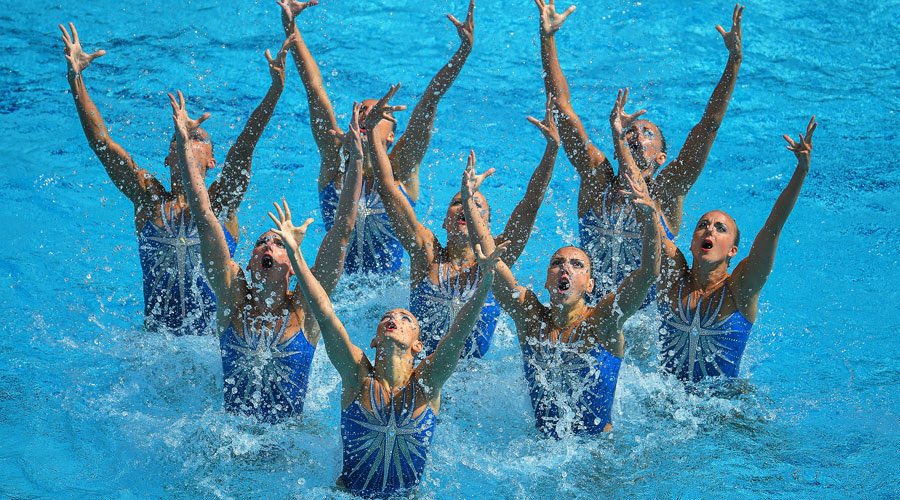Emotional Abuse of Olympic Synchronized Swimmers Is Uncovered
In recent years, synchronized swimming, now known as artistic swimming, has gained popularity in the Olympic Games. However, the reality concealed behind this beautiful sport is being uncovered as dozens of athletes have reported emotional and sexual abuse inflicted by coaches. Unfortunately, these women are not the first Olympic athletes to confess their deeply problematic experiences with abuse during training. Although allegations like these have become more common in the sphere of the games, Olympic officials have failed to take action to protect athletes. The Olympic committee and artistic swimming organizations must be held accountable, and they should act by penalizing abusive coaches and putting more regulations in place to ensure that offenses like these do not continue.
Artistic swimming was first recognized as an Olympic sport in 1984 and has been present in the summer games ever since. This sport is unique in its emphasis on combining rigorous athletic ability with art, a dichotomy that has posed difficulties for athletes. The Olympic swimmers, who are most commonly women, experience intense critique regarding their physical appearance as much of the sport’s appeal comes from their routines’ aesthetic and beauty. This has created an unhealthy environment that has pushed swimmers to develop severe self-image issues.
Many athletes have spoken out about the community’s emphasis on weight and appearance. In conversation with The New York Times, Myriam Glez, a former chief executive of USA Artistic Swimming and a two-time Olympian, stated, “if you’re not tall and super skinny — basically if you don’t look like a model — with light skin, you have no chance to get to the top level.”
Swimmers have reported that derogatory comments from coaches have further perpetuated their struggles with weight and appearance. Gabor Szauder, the national coach for Canada Artistic Swimming, has been accused of verbal abuse by five swimmers. Victims reported that he had made sexist and racist remarks during training and often made offensive comments about their physique.
This mistreatment has prompted these athletes to file a lawsuit against Canada Artistic Swimming, the organization that they believe neglected to protect them from Szauder and coaches like him. While swimmers have often been silenced regarding their experiences, this scandal has inspired many other Canadian athletes to come forward with similar allegations against Szuader.
Sion Ormand, one of the key Canadian swimmers involved in this lawsuit, reported that Szauder threatened them physically, saying, “if we kept swimming like that, he would hit us so hard, we wouldn’t know what happened.” Additionally, he had made sexual comments, telling Ormand to “zip up your hoodie before I get too excited.” Canadian Artistic Swimming officials failed to take Ormand’s complaints seriously, providing excuses and suggesting that the two parties’ cultural differences were to blame.
However, the Canadian Artistic Swimming organization’s failure to side with athletes has not stopped more women from speaking about Szuader and former Canadian coaches’ abuse. Swimmers have even begun to use an Instagram account, @mental_abuse_nac, to share their stories anonymously. Both the women who voice their concerns to this page, as well as many others who have begun to share their accounts publicly, are paving the way for change within the Olympic community.
Unfortunately, the abuse experienced by these athletes is not limited to this sport. The lawsuits made by these Canadian athletes are reminiscent of those made against the women’s Olympics gymnastics coach John Geddert as well as Lawrence G. Nassar, the national team doctor. Hundreds of women on the gymnastics team have come forward in recent years, reporting physical and emotional abuse from Geddert paired with sexual abuse from Nassar. For years, the complacent Olympic committee protected these men as they molested and abused young women together without any retribution.
An egregious theme is becoming apparent within the world of Olympic sports. Olympic officials and various sports organizations have failed athletes time and time again, hiring coaches and authorities who abuse their positions of power. Efforts must be made to change the coaching that these athletes receive, starting with proper background checks and training for hired staff. Currently, background checks are not required in all participating countries, and coaches often move countries when they are accused of mistreatment to escape penalty. This creates a vicious cycle of criminal abuse within the sports world.
While many people within the committee have silently allowed this behavior to continue, some officials have come forward voicing their support for change. The president of the Slovak Olympic Committee, Anton Siekel, for example, has stated that he is “glad we’re not afraid to talk about problems like this in sports anymore. Harassment, intolerance and violence have no place in sport.”
In Canada, the disciplinary hearing for Szuader has begun, and the Canadian Artistic Swimming team has temporarily taken a personal leave. The organization claims that it is attempting to create a “safe and healthy” environment for its swimmers, but athletes continue to voice their concerns as the committee sides with Szuader.
Jackie Buckingham, the chief executive for Canada’s federation, has issued formal apologies on the organization’s behalf. She wrote that “Changing culture is much bigger than changing leaders,” and she “believes the people who are living this experience now — athletes, staff, coaches and volunteers — are the best ones to lead us out of it.”
Hopefully, this changing culture that Buckingham alludes to will manifest itself. The lack of support and safety for Olympic athletes is contemptible and must change. While the Olympics are adored by individuals alike across the world, the integrity of sport means nothing without ensuring that athletes feel heard and are protected from further abuse.
Madeline Byrne, FCRH ’23, is a psychology major and art history minor from Freehold, N.J.









































































































































































































